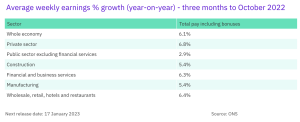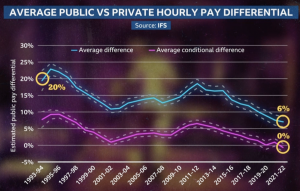Ministers are insisting that negotiation over NHS pay is unnecessary, as the independent Pay Review Body has made recommendations which the government is honouring in full. Trade unions claim PRB recommendations are too low, out of date and far from independent.
Is the Pay Review Body independent?
In a stream of media interviews about the strike ministers have claimed that the PRB is independent and free of government influence. They do not explain that at the start of the review process the Health Secretary defines the remit of their work in a letter sent to the PRB, making it very clear that its recommendations need to fit within the government’s overall spending plans and inflation targets. The health leaders of Wales and N Ireland do the same.
Effectively, this sets parameters for the PRB and a ceiling on the pay rises they can suggest. Of course the PRB could ignore the remit (the non health PRBs have occasionally had their offers rejected) but this eventuality results in the PRB failing in its core role – to be influential in setting a pay offer.
The government website explains that the PRB is funded and appointed by the Department of Health and Social security, and works within cabinet office rules. It also publishes a report to explain its recommendations, but its critics point to the fact that this year’s recommendation of a 4.5% pay rise (on average) amounts to a real terms pay cut for NHS staff and that the pay review process has helped to hold down public sector pay over the last decade.
What is the impact of the PRB upon public sector pay?
This year’s offer was set in March 2022, so has not taken account of the full scale of the rise in inflation. This time lag adds to the argument for negotiation and an adjustment to the pay offer, as inflation back in March was less than 7%, raced to over 11% and now stands at 10.67%.
The private sector has been far more responsive to the economic situation, with many companies reporting that in a competitive market they have increased wages in order to hold onto their workforce. According to the Office of National Statistics average weekly earnings growth was 6.8% in the private sector in the year to October, compared to a growth rate of 2.9% in the public sector.

The number of vacancies in the NHS stands at a new record high with more than 133,000 full-time equivalent posts unfilled in September – a 29% rise in twelve months. 47,500 of the vacancies are for nurses, an average of almost one in eight posts.
Trade unions say this is more evidence that the PRB system has consistently failed to provide big enough pay incentives to retain NHS workers within the NHS and to attract more people to work within it – which is one of its key functions.
The graphic below from a BBC newsnight report shows that historically pay in the public sector was higher by 20% in 1994, but if you take account of the higher qualifications needed in many of the public sector jobs, that difference has now totally disappeared. There is now a far greater incentive for workers to leave the public sector.

Appearing on Newsnight Jerry Cope who took part in health and prison pay review bodies said “I have chaired pay review bodies for 12-years and we fiercely guarded are independence”. He acknowledged that PRBs couldn’t make recommendations that were unaffordable, but asserted that it wasn’t just about money; recruitment and motivation were also important factors.
In response Sian Moore, Professor of Employment Relations at the University of Greenwich said
“They (PRBs) are losing credibility and looking quite toothless at the moment. they have been complicit in holding down pay for 10 years and have offered a pay settlement which is a pay cut for NHS workers.”
In reaching its recommendations, the Review Body is to have regard to the following considerations:
the need to recruit, retain and motivate suitably able and qualified staff;
regional/local variations in labour markets and their effects on the recruitment and retention of staff;
the funds available to the Health Departments, as set out in the Government’s Departmental Expenditure Limits;
the Government’s inflation target;
the principle of equal pay for work of equal value in the NHS;
the overall strategy that the NHS should place patients at the heart of all it does and the mechanisms by which that is to be achieved.
Dear Reader,
If you like our content please support our campaigning journalism to protect health care for all.
Our goal is to inform people, hold our politicians to account and help to build change through evidence based ideas.
Everyone should have access to comprehensive healthcare, but our NHS needs support. You can help us to continue to counter bad policy, battle neglect of the NHS and correct dangerous mis-infomation.
Supporters of the NHS are crucial in sustaining our health service and with your help we will be able to engage more people in securing its future.
Please donate to help support our campaigning NHS research and journalism.


